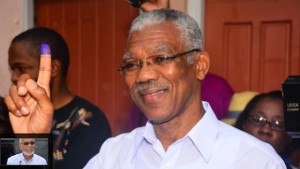
Presidential Candidate of the A Partnership for National Unity and Alliance For Change (APNU+AFC) David Granger displays his inked finger after voting at the Enterprise Primary School Georgetown Guyana, Monday, May 11, 2015. A party in power for over two decades in Guyana faced off in general elections Monday against a new coalition of opposition parties that seeks to challenge a tradition of racial politics and accuses the government of mismanagement and corruption. (AP Photo/Adrian Narine)
GEORGETOWN, Guyana (AP) — An opposition coalition challenging the governing party and the racial politics that have long dominated in Guyana said Tuesday it appeared to have won national elections, though official results had not been released.
The leader of the Partnership for National Unity-Alliance for Change told reporters the coalition’s own tabulation of publicly available results from nearly all polling stations gave it a substantial lead over the governing People’s Progressive Party.
Opposition candidates for Parliament had more than 180,000 votes, compared to nearly 130,000 for the ruling party, David Granger, a retired army general who leads the coalition, said at a news conference in the capital.
“There is no way that the PPP can close this gap that we have opened up,” Granger said.
The People’s Progressive Party said the race was too early to call. The Guyana Elections Commission was still tabulating ballots from remote parts of the South American country and was not expected to announce the first official results until Wednesday.
The governing party, the opposition coalition and a handful of small parties were vying for 65 Parliament seats.
Guyana President Donald Ramotar shows his ink-stained finger after voting in the general elections, …
The Carter Center, which had observers at nearly 300 polling stations, reported no major problems despite scattered clashes among rival factions during Monday’s voting.
“All Guyanese should be proud of what transpired on election day,” the center said in a statement. “This is especially true because their efforts took place in an atmosphere of tension and anxiety that, unfortunately, was generated by key political leaders who played on fears during the electoral process.”
Former U.S. President Jimmy Carter left the country just before the vote because of a cold.
Granger’s multi-ethnic coalition challenged a tradition of politics that has broken down along racial lines in the country on the northern shoulder of South America.
The People’s Progressive Party of President Donald Ramotar, which has been in power since 1992, has traditionally appealed to people of Indian descent while people of African descent have formed the core of support for the opposition.
But the opposition coalition seemed to be drawing support across racial lines following a bitter political period that culminated with Ramotar dissolving Parliament in February.
